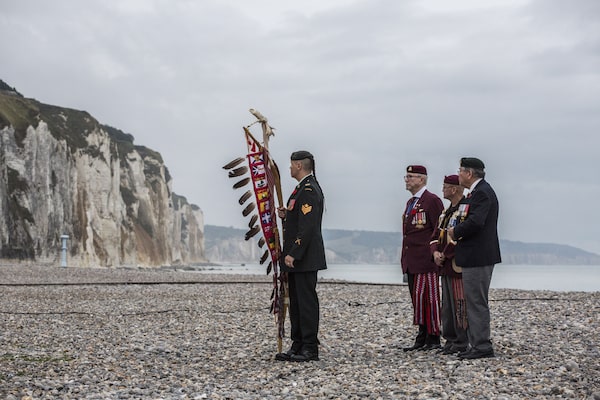
Eagle Staff Bearer Sergeant Moogly Tetrault-Hamel, left, at an Indigenous Sunrise ceremony in Dieppe, France, on Aug. 18, 2017.The Globe and Mail
There will be a number of ceremonies held Monday to mark Canada’s annual Indigenous Veterans Day, first observed in 1994. But, as the country pauses to remember the sacrifices of its First Nations, Métis and Inuit soldiers, it will also continue to grapple with the fact that many of them were denied benefits given to others who served in the Canadian Armed Forces.
Manitoba Métis Federation President David Chartrand, who led years of advocacy that culminated in a 2019 federal apology to Métis veterans of the Second World War, told The Globe and Mail that Canada failed to fulfill its promises to Indigenous soldiers of that era.
While other veterans received government assistance that helped them rebuild their lives, he said, Métis soldiers were told to go back to their trap lines.
“They were left to fend for themselves,” Mr. Chartrand said. “I spoke to these veterans for over 20 years, fighting for them. And a lot of them, people don’t realize the trauma that they went through.”
Canada’s flag will be raised on federal buildings ahead of week of commemorations
Gaining recognition for Indigenous veterans, he said, has been a “painful and excruciating” process.
In its 2019 apology, the federal government acknowledged that Métis soldiers in the Second World War had experienced prejudice and poverty, and had been denied educational opportunities, vocational skills and work experience prior to the war.
At the time of the apology, Veterans Affairs Minister Lawrence MacAulay said benefits offered to soldiers after the war were not designed to meet the needs of Métis people. He added that he regretted that Canada had taken three-quarters of a century to address the inequity. The government offered Métis veterans of the war a collective $30-million in compensation.
Métis soldiers were not the only group denied benefits after the Second World War, according to Scott Sheffield, a history professor at the University of the Fraser Valley who has extensively researched the experiences of Indigenous veterans.
First Nations people were likewise not given information on the kinds of benefits available to former soldiers, he said, and were instead simply told to go back to their communities, where they would be looked after by Indian agents, the federal government’s official representatives at the time.
“That was a real problem,” he said. “Indian agents were not experts in the diverse programs available to veterans.”
The involvement of the Department of Indian Affairs resulted in veterans’ benefits being warped to fit the agenda of the department, which included the cultural assimilation of Indigenous peoples, Prof. Sheffield added.
A 2001 report from a national roundtable on First Nations veterans detailed the ways they were treated differently than other former soldiers when applying for financial benefits and compensation. In 2003, the federal government apologized to First Nations Second World War veterans and offered them, or their spouses, up to $20,000 each in compensation.
Prof. Sheffield noted that although the sacrifices made by Indigenous soldiers are now recognized, this was not always the case.
“In a lot of ways, they were erased from our collective acts of commemoration,” he said. “That’s really changed.”
But some Canadians may still not be familiar with even the most famous Indigenous veterans: for instance, Tommy Prince, who was one of the most decorated Indigenous Canadian soldiers in history. He served as a reconnaissance expert during the Second World War. On one occasion, he posed as a local farmer to repair a severed communications wire while in full view of German troops. He later served in the Korean War.
Francis Pegahmagabow, an Ojibwa from the Perry Island Band in Ontario, was decorated for his contributions in the First World War. Corporal Pegahmagabow earned the first bar to his military medal in November, 1917, for his service at Passchendaele.
During the Second World War, Charles “Checker” Tomkins, from Alberta, translated sensitive radio messages into Cree so they could not be understood by the enemy. Another Cree-speaking “code talker” would then translate the message for its recipient.
The participation of Indigenous veterans in the Canadian military over the years has been significant, according to Veterans Affairs Canada. The department estimates that as many as 12,000 Indigenous people served in the two World Wars, and at least 500 lost their lives.
For subscribers only: Get exclusive political news and analysis by signing up for the Politics Briefing.
 Kristy Kirkup
Kristy Kirkup